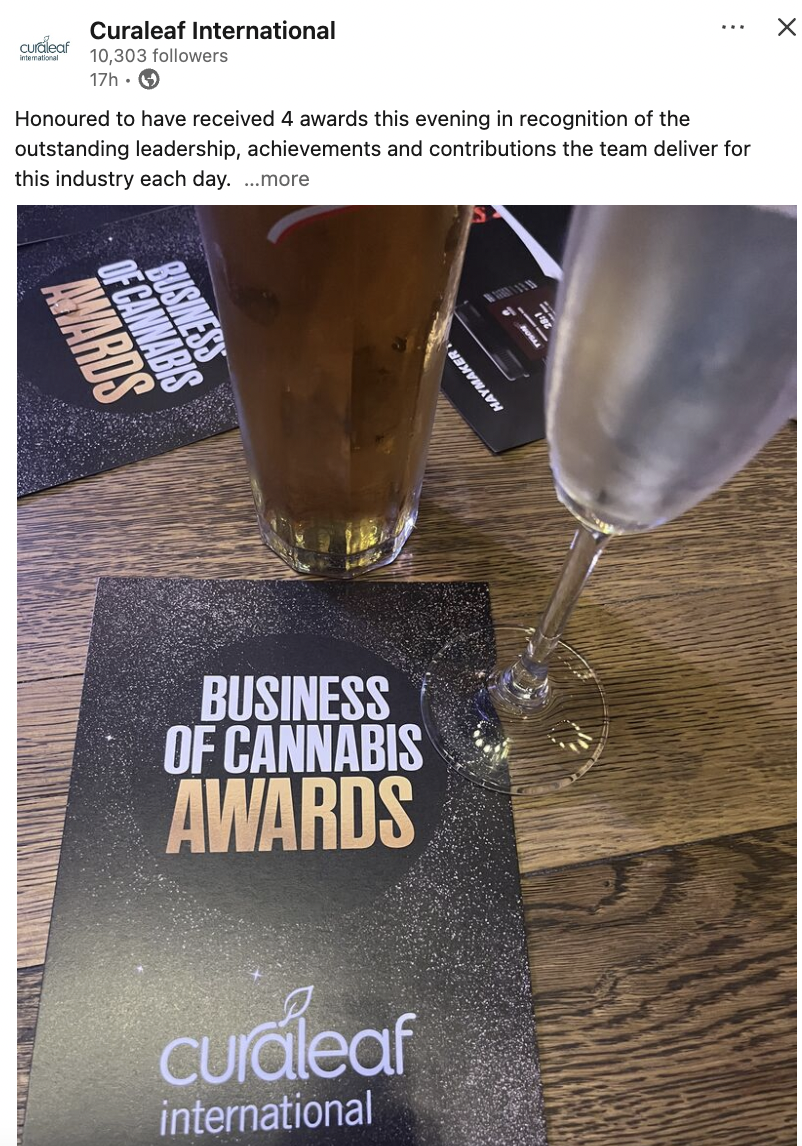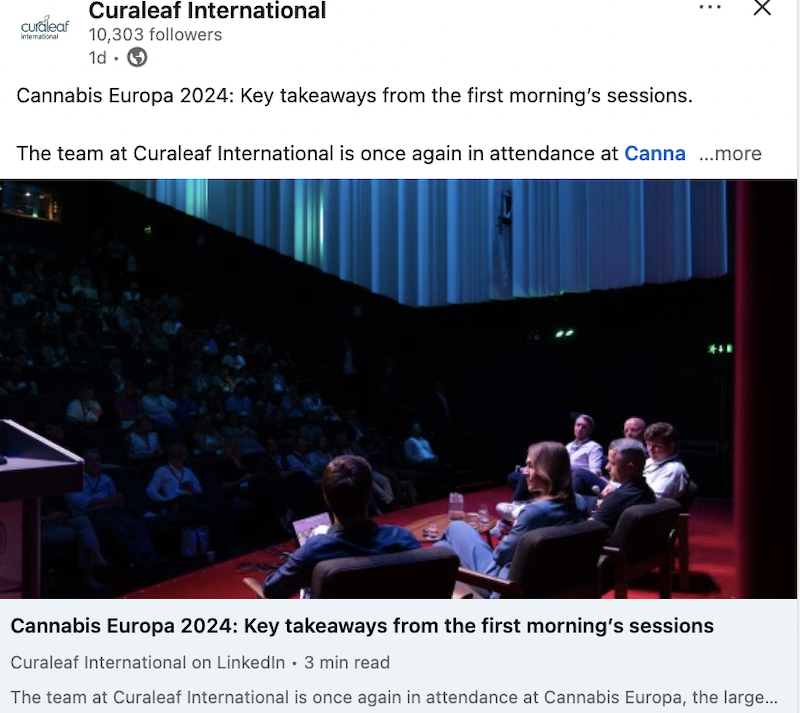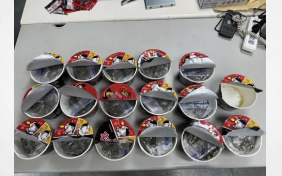Yes I may be a bit pedantic following this day by day but the Boris sales caravan just keeps on rolling on.
This European play is obviously important to the company otherwise they wouldn’t be spending so much time, energy & $’s on it.
Today the pitch is – “The Europeans Have Their Regulatory Shit Together” and MJ Biz is the organ he uses disseminate the argument because he knows that it’s the main cannabis media outlet read by biz and finance types in the US.
I’m not sure Boris really believes in his heart of hearts that Europe is the promised land, he’s not a stupid man.
He knows (or should) that Germany isn’t the well oiled machine that many weekend commentators are making it out to be.
He also knows that Brussels is going to be a hard nut to crack and also knows that the UK regulatory market is an extremely limited shop and unless the new Labour government get really desperate for revenue they won’t be going all free market on cannabis anytime soon.
But, if he can play the medical platform supply game and defeat the other players coming into the market as well as get his sales people into the NHS network he has a good base from which to start.
In the meantime it’s fun to follow the unbridled excitement as the Prohibition Partners annual Barbican shindig promises the golden future of milk and honey for all .
Next week it’ll still be still austerity Britain, gambling Tories, the England football team crashing out of the Euros and, yes it’ll be raining again.
At least Assange has escaped Belmarsh and touched down on Australian soil. Maybe i’ll get in touch and ask him to turn wikileaks attention to the cannabis industry!
Oh I almost forgot – MJ Biz
LONDON – Massachusetts-based marijuana multistate operator Curaleaf Holdings first entered the European market in 2021 with the acquisition of Emmac Life Sciences.
Two years later, the company purchased a Portuguese marijuana cultivation facility from Colombian producer Clever Leaves.
Curaleaf co-founder and Executive Chair Boris Jordan sat down with MJBizMagazine at Cannabis Europa on Tuesday to discuss his company’s evolution and what he believes is in store for regulated marijuana companies at home and abroad.
When you founded Curaleaf in 2014, did you know you wanted to take the business international?
2014 was early days in the U.S. industry, and I don’t think anybody was thinking much beyond the East Coast of the United States at that point in time.
Our strategy was very much establishing business in the East Coast of the United States: We started in Massachusetts, New Jersey, Maine and New York, and then we started moving ourselves further south into Florida and Maryland.
Really, we didn’t start looking at Europe until much later, but it was a natural progression for us because I had just moved from Europe back to the United States around 2014.
Curaleaf acquired Northern Green Canada this spring. How did that deal come together?
What we wanted to do is make sure we had a steady supply of indoor flower (in Europe).
Our partners in Germany, 420 Pharma, were working with a company called Northern Green in Canada.
They were importing from Canada, and we were probably buying 60% of that production.
Then we started financing new grow rooms because they didn’t have capital, and (we realized), “Why are we paying a margin of 25% buying this flower when we have 60% of their demand anyway?”
It made a lot of sense to buy them: It improved our margins dramatically because now we don’t have to pay that extra margin.
And if we’re putting in capital to build out facilities, we’re putting capital into our own business rather than somebody else’s business, so it made a lot of sense from our perspective to make that deal.
What do you think the future of cannabis M&A activity looks like?
I know it’s probably an unpopular thing to say, but the way I see the cannabis sector developing over the next 10-15 years, you’re probably going to have five to a maximum of 10 large players.
In the U.S., we definitely need consolidation because the cost structure is completely out of whack because of the interstate commerce issue.
So, companies are spending way too much money – even the big MSOs.
From a global perspective, the cost structure is really, really high compared to what it could be if (plant-touching companies) came together.
There’s regulatory challenges to that, because in the U.S., these companies are regulated on a state-by-state basis, and the states have put up these anti-monopoly barriers.
You can’t own, for instance, more than three stores in New York or three stores in New Jersey; you can’t own more than 10 stores in Illinois.
Some states like Florida and Arizona are limited, but for the most part – particularly the East Coast states – you have these artificial barriers, and that’s causing the industry now to have a very high cost base.
In Europe, it’s a very early stage business.
Eventually there will be consolidation. But with any consolidation, you’re also going have new companies starting up.
It’s a never-ending cycle.
Does Curaleaf still own greenhouses in Portugal?
Oh, absolutely; we’ve really upgraded those facilities dramatically from what we bought.
We’ve been exporting flower from there to the U.K. for some time, and the quality has really improved dramatically.
Now we’re starting to export into Germany and to Poland.
The Portuguese facility … it’s got much more capacity than we even need, so we can grow into it as demand grows.
Our strategy isn’t to supply 100% of our own grown product – we want to have only 50% of our supply chain homegrown; the rest of it, we buy.
So, we wanted to have a balance between the two, and we have more than enough capacity at the moment between our Northern Green facility in Canada and our facility in Portugal to supply our markets (in Europe).
What are some things Europe and the U.S. can learn from each other?
The U.S. needs to get its act together.
Ninety percent of the United States has access to either adult-use or medical cannabis, and the federal government doesn’t have a single memo that recognizes this $60 billion sector between the intoxicating hemp market and the regulated marijuana market.
The hemp market was created through a backdoor loophole rather than through an initiative to try and stimulate or regulate the cannabis market.
So, the U.S. is just a disaster from a regulatory perspective: Every state has different rules, the federal government has no rules. It’s a free-for-all.
I think the approach the Europeans are taking to this is a smarter approach than what the United States did in the initial stages.
And the U.S. is paying for it now because you’ve got companies that are barely alive because of the regulatory front.
If this continues much longer, you’re going to see a massive wave of U.S. bankruptcies in the cannabis space.
It’s already happening.
But wait – there’s more
Too much Curaleaf is barely enough
A 2 minute scroll on my linked in this afternoon just brought post after post of great news





















